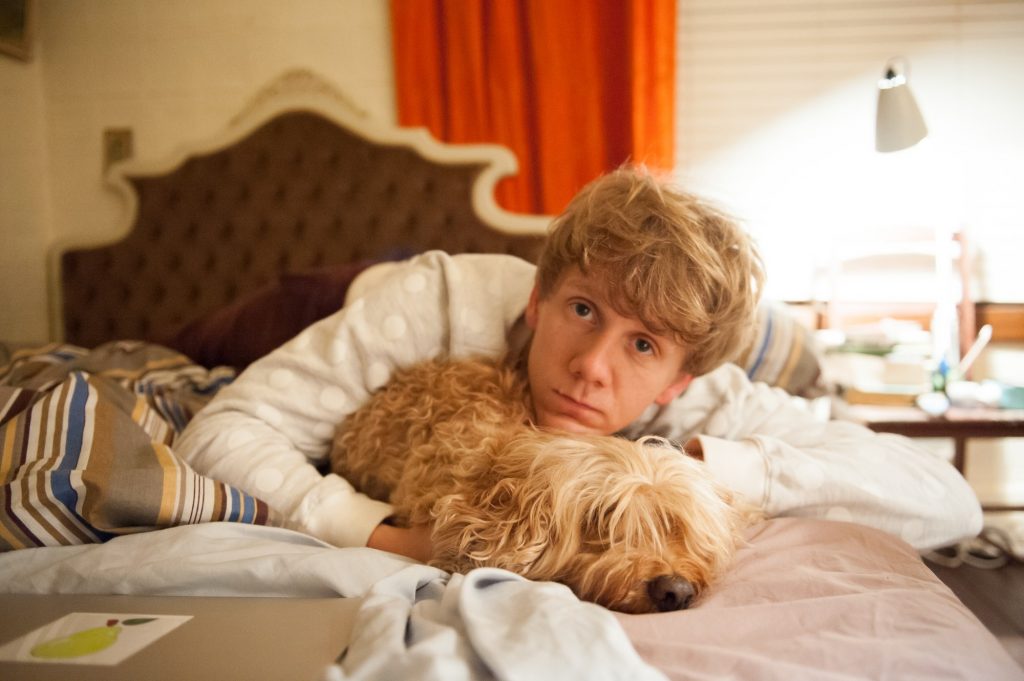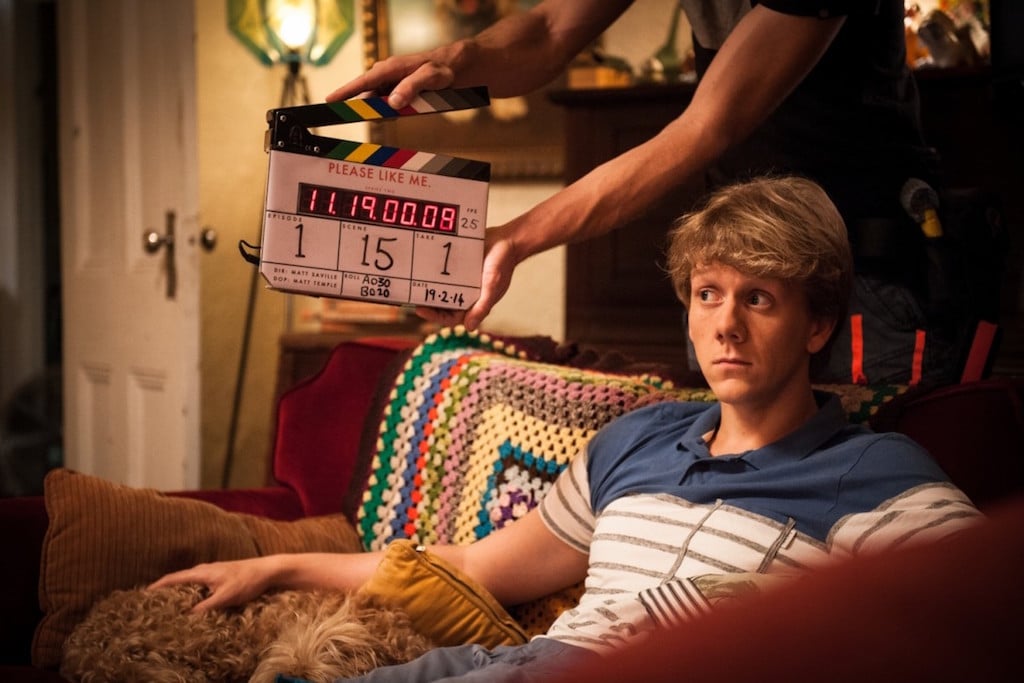Josh Thomas On New Show ‘Everything’s Gonna Be Okay’, And What Makes Him Laugh
“I really, really love it when my friends make mistakes, and tell me a funny story about the mistakes they made.

Josh Thomas’ favourite Australian chocolates are Maltesers and Marvellous Creations Jelly Popping Candy chocolate bars — a fact he immediate regrets telling Junkee. “I’m embarrassed to reveal that,” he admits.
They’re the chocolates his friends bring over when they visit him at home in Los Angeles, where he’s doing press ahead of the US and Australian premiere of his new show, Everything’s Gonna Be Okay.
The series sees Thomas as Nicholas take on caring responsibilities for his two American half-sisters, Genevieve (Maeve Press) and the autistic Matilda (Kayla Cromer), after their father (Christopher May) passes away.
Thomas has previously said that he hoped to portray neurodiverse people with the same care and nuance with which he approached mental illness in the critically acclaimed Please Like Me.
The show also features his signature style — acidic one-liners (“I already knew my son does anal sex, probably terribly. Ice tea?”), a pet dog, gratuitous shots of food, and possibly inappropriate, but nevertheless heart-warming dance breaks — as he tackles other subjects like grief, puberty and sexuality.
The Best Version Of Josh Thomas
“I feel like [Nicholas is] the best version of me, and Josh in Please Like Me was the worst version of me,” Thomas says.
“I’m not a talented actor. I’m not pretending to act,” he laughs. “That’s me being myself — I don’t really know how to do anything else.”
But Nicholas, because of the “monumental task” in front of him, has to be “a really nice, innocent guy that tries his best”.
“He’s really a lot more thoughtful and generous probably than I am.”
But, while he describes his character in Please Like Me as likely meaner than he is in real life, he acknowledges that they’re both erratic, and a little self-involved.
“It always shocks me a little bit when people see them as self-involved, because I don’t think so at all. And then I realise that I don’t know myself as well as I think I do.”
To all Best Of The 2010s lists: Don't forget about Josh Thomas's hilarious/heartbreaking PLEASE LIKE ME! It feels like you're forgetting about PLEASE LIKE ME, and I'm upset! pic.twitter.com/GJiRuDa2O8
— Cameron Scheetz (@cameronscheetz) November 20, 2019
Failing Is Very Funny
Josh Thomas laughs the most when people try their best and then fail. “That’s the cornerstone of comedy, I think.”
It’s not a malicious sensibility: he clarifies that it’s funny when people he likes, who aren’t upset about their failure, don’t meet their own expectations. What he’s interested in humour-wise is emotional stakes, and real human interactions.
“I really, really love it when my friends make mistakes, and tell me a funny story about the mistakes they made. To me, that’s the dream. I love it when I make mistakes and get to tell my friends about it.”
While he’s not interested in jokes about poo, per se, he does concede that a “high-stakes poo” would align with his sense of humour, and his interest in awkward situations.
“My friend did a shit on the side of a very busy path in LA, because she couldn’t help it, and then had to wipe her butt on like a [NFL team, Miami] Dolphins jersey, and left it in the bush. That’s a high-stakes poo — when you’re trying to sneak it past people.
“If my friend did a fart in front of me, that wouldn’t be funny because I obviously don’t care. But if my friend did a fart during a wedding while they were getting married, then I would be very interested [laughs]. For me, it’s about the situation.”
Other things that do not make him laugh: puns, bodily functions, gross-out humour, innuendo (“I’m not that scared of sex that innuendo’s funny… just say ‘sex’, or just say ‘dick’”), clever comedy (“I hate people showing me that they’re clever, and that being funny”)…
“I struggle with funny performers, which is really hypocritical, because that’s what I do for a living. But watching people try to make me laugh, I don’t like it that much.”
Being Generous With Laughter
Thomas knows that he’s not generous enough with his laughter. “I think it’s one of my biggest personality flaws.”
He first started doing stand-up when he was 17; now he’s 32. He thinks that goes some way to explaining why he is “meagre” with his laughter, even when a friend’s funny story deserves more. “Comedy has been such a theoretical exercise for me my whole life… It’s been ruined a bit for me.”
He describes the way comedians often laugh for seconds after a punchline, withholding their laughter until after they’ve processed the joke and examined its internal logic. “They do this annoying ‘good on you’ laugh, and it’s not real. Sometimes I find myself doing that.
“Everyone should be more generous with their laughter and I’m just not that good at it. Unless I’m drunk,” he chuckles. “So maybe I should just drink more…”
Please Like Me’s Josh Thomas also has a new show on Freeform, about a young gay man caring for his teenage stepsisters, one of them autistic… The opening eps are a little unbaked, but the strongest bits are moving & original & the actresses who play the sisters are fantastic.
— Emily Nussbaum (@emilynussbaum) November 27, 2019
Finding Lightness In The Dark
When Please Like Me first aired on ABC in 2013, it was still novel to blend humour and sadness into one show, examining difficult subjects like mental illness or abortion, while also finding ‘lightness’ in any given situation.
One of the first conversations Josh Thomas had about the show when they were pitching it was about that demarcation between ‘comedy’ and ‘drama’. “Now that doesn’t sound like that exciting an idea,” Thomas says. “But when I was 19, that was sort of interesting. And it’s all we ever try to do.
“I’m just trying to reflect real life, and in my real life when bad things happen, also funny things happen… I feel like all situations have comedy, most big events have comedy and sadness in them.”
In real life, then, Thomas tries to make people laugh when something bad happens. With both Please Like Me and Everything’s Gonna Be Okay, Thomas says, “I treat my audience the way I treat my friends. When something bad happens, I try to cheer them up the same way I would if they were someone that I knew.”
And the people Thomas spends time with share that sensibility — both his family and friends. He points to a moment in the first episode of Please Like Me, where we are introduced to Mum (Debra Lawrance), who has just attempted suicide by taking a box of Panadol, washed down with half a bottle of Baileys.
A doctor asks if Mum has a headache, and Josh replies, “A headache? She took quite a bit of Panadol.”
Josh continues to Mum: “If you get a headache in the next few weeks, I really think you should be calling their customer complaint line.”
It’s a line Thomas nicked from his aunt, when Thomas’ mother first attempted suicide. “I think that was such a funny thing to say in a challenging time. It’s so nice that she got to bring light into that difficult situation in that way.
“Then I stole it and gave it to my own character in my own show, and pretended it was my own writing — so thank you to her.”
Another example comes from his friend, whose mum recently died. But his friend and Thomas were at a party when she found out. “She had to drive to the hospital, and then spent the next 24 hours in the hospital in fuck-me-boots. She just thinks that’s so funny, and so do I.
“In hard times, finding the absurdity, finding those little moments of weirdness are to me, so precious. If I’m going through something sad, I don’t want to sit around and bask in the sadness, you know? I want to kind of find light.”
Thomas says that he strove not to make Everything’s Gonna Be Okay suit some imagined American comedic sensibility. “I’m just trying to keep it my own,” he says.
“I think that [Americans] love the saccharine moments of [Please Like Me] more than we might in Australia,” he notes.
But because the series was made without an international audience in mind — even if from the second season the show received some American funding — he “made it the way [he] wanted to make it”. The series now plays on Netflix in most countries in the world.
“Not second guessing what [American audiences] would like really gave them something different, a different point of view to what they’re used to.
“The amount of people and different cultures who have connected with what felt like a very specific, very personal, and for me, very Melbourne story and world, has been nice. I think the fact that we never tried to consider what the difference would be and just tried to make it specific and personal is what made it succeed.”
Betraying John The Dog
Josh Thomas asks his friend Courtney to remind him of a recent moment where they laughed a lot. He dismisses a story about another friend as too private — “He’ll kill me” — and by the time she suggests the time she and Thomas made Lizzo’s ‘Phone’ into a song about themselves, Thomas sighs: “I’ve gone poo story now.”
The last moment that made him laugh a lot was just a day earlier, when his dog John — who became internationally famous for his coy starring role in Please Like Me — tripped over, as old dogs do.
“And then he fell over, and on his way down, he accidentally did a poo. And then he looked at me with the funniest expression I’ve ever seen in my life. I laughed at my old man.”
It’s not something Thomas is proud of. Dr. Chris Brown himself taught Josh Thomas that dogs do know when you laugh at them, and that they’re capable of feeling shame.
Thomas starts to talk to John, “Didn’t you, buddy?” before explaining, “He’s looking at me so betrayed right now.”
Everything’s Gonna Be Okay airs weekly on Stan from 17 January.
Hannah Story is a writer and editor from Sydney. She too is going to be okay.
